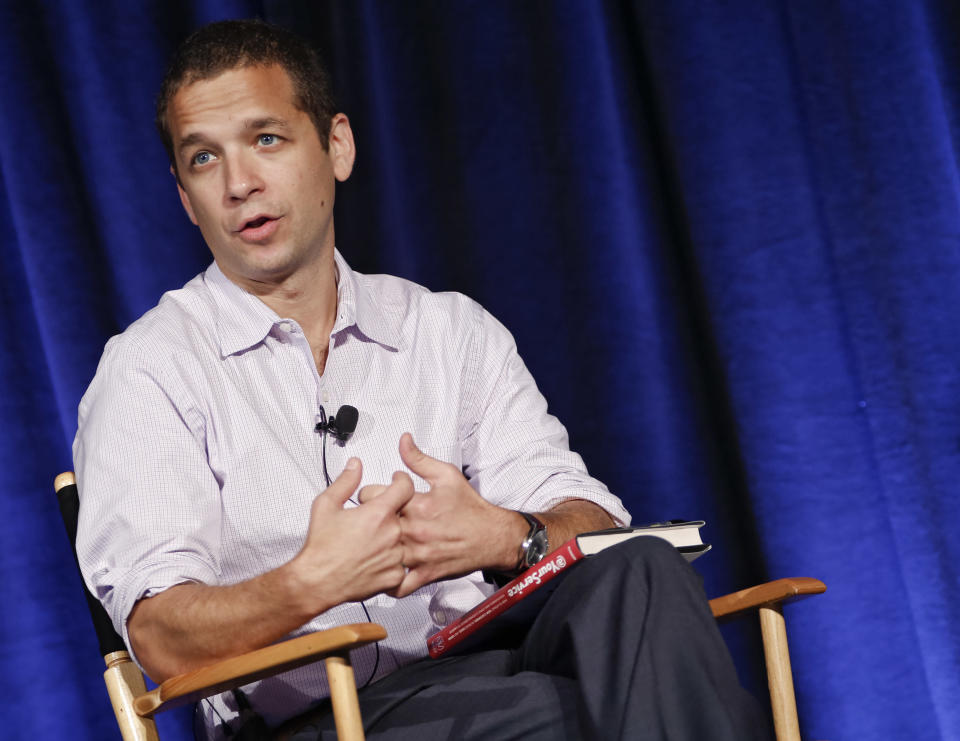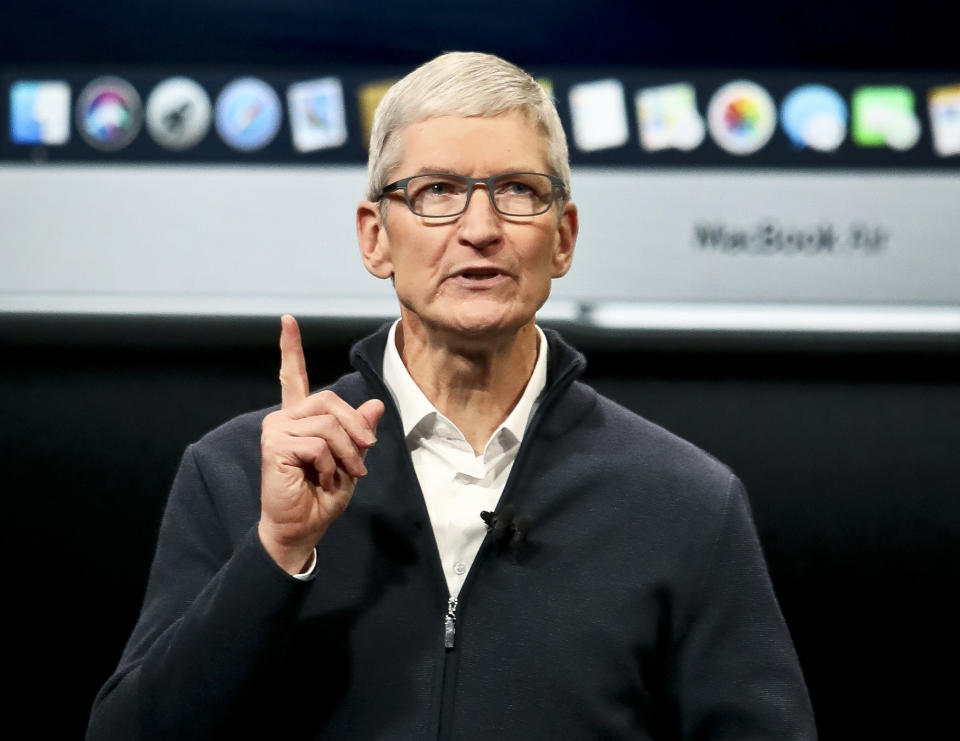Facebook, Apple, and LinkedIn and the fight for news
As the author of the piece, I’m delighted you’re perusing my article anywhere, but a bit frustrated you probably aren’t seeing it on Facebook.
Before Facebook changed its News Feed last January, I could post my stories—or my colleagues’ or friends’ stories—on my timeline and watch as it was magically distributed across the platform. Comments and shares would roll in, not only gratifying my insatiable journalist’s ego, but also informing me, adding to my understanding of the subject matter, and maybe even helping me write better pieces down the road. Now when I post, no one sees. Not even my wife (a guaranteed “like.”) And so I’ve been putting my stories up on LinkedIn and people have been responding there. (Ditto with Twitter.)
Writer Andy Serwer is small potatoes of course. My bigger concern is as Editor-in-Chief Andy Serwer, because the real issue is for news organizations writ large—from The New York Times to Buzzfeed to Catster.com, and yes Yahoo Finance—as Facebook has cut back on the amount of news in its algorithm. That’s hurt news businesses. In fact Facebook’s policy shift is coincident with, and no doubt has in part caused, a recent significant decline in the value of digital media companies.
‘You had Facebook actively courting publishers for a long time’
So how much less news is there on Facebook?
A Facebook spokesperson told us the amount of news in the News Feed has declined from 5% to 4%, suggesting it’s a small drop (though I’m sure you realize that a one percentage point decline in this case is a 20% decrease). Personally though, I’m not seeing any news in my News Feed at all. High school reunion pictures, yes. Ads, yes. But no news. I’ve spent enough time in the internet news business to know that the people at Facebook who are in charge of the News Feed no doubt will tell me that I am mistaken, or that my experience is anecdotal, but I know what I see.
Facebook is free to change its policies any time it wants of course, but its fickleness has left many in my world vexed.
“You had Facebook actively courting publishers for a long time,” says David Skok, editor-in-chief at The Logic, a subscription-based business news website. “They paid publishers to be on their platform. Without notice they shifted. I think the lack of congruency on Facebook’s end about its intentions and motives were, wasn’t a good look for Facebook and in some respect they’re facing a backlash. They made enemies out of publishers.”
But weren’t publishers deluding themselves by basing their business models to one degree or another on a giant company’s whims?
Yes, says Martin Nisenholtz, former head of digital strategy at The New York Times, professor at Boston University and co-author of “Riptide,” a Harvard study about the digitization of the news business. “People like to call these things [Facebook and Google, etc] distribution platforms, but distribution in media terms is an agreement for three, five, 10 years. ‘I’ll do this for you in return for reaching these numbers of people over time.’ It’s a very specific agreement. [But] these are not distribution agreements in a sense they’re designed around reaching people through some kind of manipulation or presumed manipulation of the algorithm. That’s very changeable. Once Facebook changes the algorithm, your distribution falls apart. There’s no agreement in that context.”
Could this backfire for Facebook?
Like the honey badger, Facebook doesn’t care.
Publishers have figured out Facebook now has to figure less in their plans. “We’ve certainly seen a decline in the importance of Facebook as part of our overall blend,” says Matt Karolian, director of news initiatives at the Boston Globe.
Karolian points out this could ultimately hurt Facebook: “Facebook is supposed to be a relative reflection of real world. Core to people's identities are things they believe in socially and politically. Trying to mute political and idea expression on Facebook makes it a slightly less engaging place to be,” he says.
Or maybe not.
Last January Facebook CEO Mark Zuckerberg said the company would deemphasize news because it was “crowding out the personal moments that lead us to connect more with each other.” (Oh and, by the way, the change also helped the company move away from a content category that is divisive and fraught with risks like fake news.) Has this hurt or helped investors? The stock dropped initially on the announcement last year (investors wondered if the company had weakening engagement), but RBC Capital Analyst Mark Mahaney says: “It was a useful change and I think investors have ignored it. Looks like satisfaction has risen at Facebook.”

A quick take on this might be that while Facebook is retreating from being a news source, Apple, LinkedIn, and others including perhaps a revitalized Google News are moving it to fill the breach. There is some irony here I guess in that Facebook was at once held up—and held itself up—as the shining savior of the news business. And now riding to the rescue are two pre-internet tech companies: Apple and Microsoft (which owns LinkedIn).
When Dan Roth, editor-in-chief of LinkedIn, joined that company eight years ago, he was the sole editorial employee. (Full disclosure: I worked with Dan at Fortune Magazine prior to that.) “Now we’re up to a team of over 50 editors in New York, San Francisco, Berlin, Munich, Sydney, São Paulo, and London, creating, curating, or cultivating content to get professionals talking,” says Roth. LinkedIn’s Daily Rundown reaches 60 million people, Roth says. (NB: Apple’s been hiring journalists too.)
But Apple and LinkedIn aren’t exactly the U.S. Cavalry. The relationship between publishers and platforms that distribute content is at best complex and ever-changing. Few if any relationships between publishers and tech giants are truly happy ones.
Why is that?
‘30% is just not a number we can work with right now’
First and foremost, executives at Apple, LinkedIn, Facebook, Google, or Twitter (and Amazon even) aren’t really interested in the news business except to the extent that it benefits their businesses. Yes LinkedIn has hired real journalists, but it isn’t really a news publisher or a distributor of news, nor does it hold itself up that way, (though those lines are blurring).

And yes, Apple CEO Tim Cook has talked about how much he cares about news—and I believe him. But maybe he cares a bit less about the news business. Apple takes 30% of the subscription revenue in year one (and 15% in subsequent years) from publishers and owns the subscribers’ data. True Apple isn’t running a nonprofit, but if Cook really cared so much, why do nearly all media companies complain about his terms?
“Apple News has been a very good platform for us ... but 30% is just not a number we can work with right now,” says Karolian of the Globe. “I think a lot of other publishers feel the same way. We’re operating on pretty thin margins, to take a 30% cut for payment processing feels pretty rough. Jason Kint, CEO of Digital Content Next, says, “In terms of quality of experience there’s a lot to like [about Apple News]. [The] concern has always been on monetization side.”
I guess you could make the point that the folks who ran newsstands didn’t really care about news either, but they sure as hell cared about getting newspapers and magazines at reasonable terms because selling them was how they made money. Not true for tech giants.
All of the above argues, begs really, for subscription-based models coupled with freemium and/or pay walls. In other words, create great content and sell it directly to consumers at a price the market will bear. Don’t rely on advertising (another problem child I’ll perhaps tackle soon) or the tech giants—they just aren’t that into you.
Many legacy media outlets—The Times, Wall Street Journal, and The Washington Post—are headed that way. Startups like the aforementioned The Logic and The Information (what is it with the definite article) are subscription native.
Lastly, it’s worth pointing out how nascent and touchy the relationship between news and the internet is. Shockingly so in fact. Last fall, The New York Times ran an informative story on Apple News and its editor in chief, Lauren Kern, a former New York Magazine editor who works at Apple headquarters in Cupertino. The story lays out Apple’s efforts in news and the perceived pluses and minuses publishers see in working with the company. One subordinate clause caught my eye however. The Times piece mentions an important story according to “...Ms. Kern’s deputy, a former editor for The New York Times whom Apple requested not be named for privacy reasons.”
Imagine reading that “not be named” point in a story about an executive at Ford working a new line of trucks. Sure, the news business isn’t the truck business and never has been. But now hyper-partisanship and the digital revolution with all of its implications including wrecked business models and Russian hacking have made for an incredibly fragile and changeable environment.
News organizations, tech giants, and our society are going to have to soldier through it. Writer Andy Serwer, too.
Andy Serwer is editor-in-chief at Yahoo Finance.
Read more:
A simple, yet radical solution to solve Facebook’s problems
Imagine Facebook without the ads but with a monthly fee
Tech companies are suffering from a success delusion
Mark Warner: This will ‘send a shiver’ down the spine of Facebook, Google, and Twitter

 Yahoo Finance
Yahoo Finance 